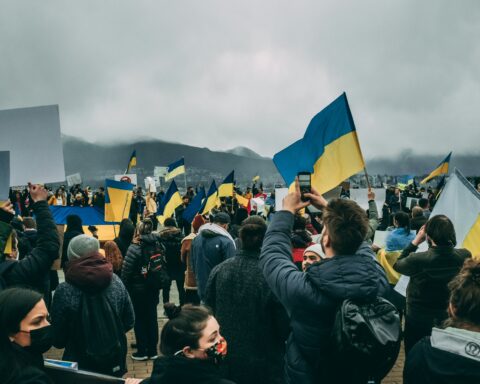Yurij Fojczuk immigrated to Canada in 1912 and set up a homestead. He would come to be known as George Forchuk.
Two years later, in 1914, Forchuk was arrested under the War Measures Act for no other reason than his Ukrainian heritage. He was sent to Jasper Internment Camp where he was forced to perform heavy labour under awful conditions. After months of brutal treatment, he ran away, guards in hot pursuit and bullets whizzing past his ears.
Forchuk hid until the war’s end. When he returned to his homestead, he discovered that the government had given away his land to someone else. He had to start anew.
His granddaughter, Marsha Skrypuch, shared his story with New Canadian Media, recalling how the experience affected him for the rest of his life. “The shame of his unjust internment stayed with him until his dying day,” she said.
But those memories are bittersweet today as 100 plaques are unveiled across the country at 11 a.m. (local time) as a “wave of remembrance, hallowing all victims of Canada’s first national internment operations”.
Dubbed “Project CTO”, bilingual plaques commemorating Canada’s first national internment operations of 1914-1920 have been installed in parish halls, cultural centres, museums, and archives. The first internment operations affected not only Ukrainians, but German, Hungarian, Serbian, Croatian and Armenian communities, according to the Ukrainian Canadian Civil Liberties Foundation. The Foundation is spearheading the commemoration with the support of the federally-funded Canadian First World War Internment Recognition Fund.
“I am thrilled about the 100 plaques being unveiled across Canada in recognition of the 100th anniversary of Canada’s WWI internment operations,” said Skrypuch. “Canadians do need to recognize and acknowledge injustices of the past because what we don’t acknowledge, we are bound to repeat.”
“Canadians do need to recognize and acknowledge injustices of the past because what we don’t acknowledge, we are bound to repeat.”
Skrypuch, author of 19 books, three of which are set during Canada’s WW1 internment operations, is releasing a new book at one of today’s ceremonies. The book explores the experiences of a group of people who fled the Ottoman Empire to her hometown of Brantford, Ontario, “only to be interned as enemies,” she said. The book is titled, Dance of the Banished.
It is estimated that over 8,500 “enemy aliens” were rounded up and imprisoned during the First World War. They were unconnected to the conflict. They worked on public projects including the country’s railways.
“The way that I have dealt with my grandfather’s unjust internment is to write about it,” explained Skrypuch. “My theory is that dark secrets left alone will fester, but those that are aired out will be better understood.”
Amira Elghawaby is an award-winning journalist and human rights advocate. Along with frequent appearances on Canadian and international news networks, Amira has written and produced stories and commentary for CBC Radio, the Ottawa Citizen, the Literary Review of Canada, and the Globe and Mail. She is currently a freelance contributing columnist for the Toronto Star.





